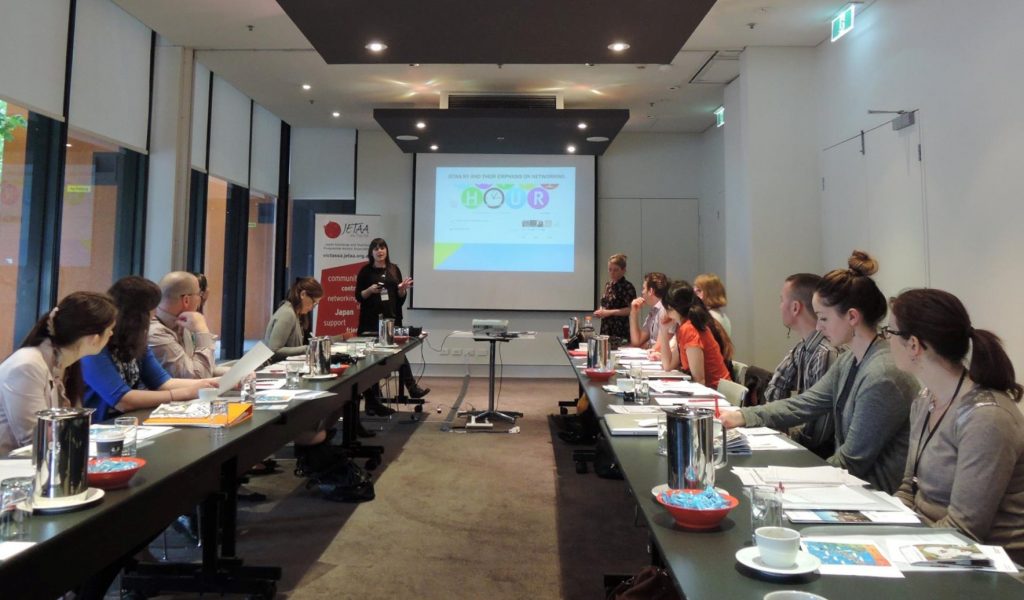Melbourne, Oct 25-26 2014

[The following is a modified version of the report by Eden Law, first published in JET Streams, an online magazine maintained at the official JET Programme site. Image by Hiromi Hakuta of CLAIR]
The 2014 conference theme was “Staying Relevant”. The conference reflected a ‘back-to-basics’ approach, in tackling long-present issues of membership recruitment, visibility and maintaining ongoing chapter dynamism and viability. Each chapter was invited to do a presentation on the theme, and presentations ranged from providing examples of projects that focused on community engagement, tools for online outreach and exploration of what the concept of “relevance” is in the context of JETAA. The following is a brief outline of those discussions:
- Providing practical services such as career and networking opportunities for JET returnee engagement;
- Online tools are important, such as Meetup.com for event promotion, and Japanese social sites like Mixi to attract native Japanese speakers. LinkedIn is also a great resource for networking and making professional connections;
- Many chapters advocated supplementing their budget for organising events with capital raised from food and drink stalls;
- The importance of conferences as great motivators was recognised. Wherever possible, new JETAA members will be given priority when selecting delegates for future conferences;
- Certain events, such as Japanese-English language exchange events, were highlighted as being consistently popular;
- Many chapters have added more roles to their committees, and have changed their charters to stay up to date with changing needs of their community;
- Chapters were encouraged to provide a support network for Japanese ALTs;
- Japanese-related university groups are great places to make contact with potential JETs.
This year’s guest speaker was Leonie Boxtel, former Director of Alumni Relations and Communications at the University of Melbourne. Leonie was a JET in the second year of the Programme itself, so it was great to hear from one of the original sempai generation. Bringing her experience in fostering alumni connections, she shared the following insights:
- In order to get organisations to work with JETAA, JETAA must show the value proposition of how and why it would be useful and worthwhile for them to do so;
- Delegates should set objectives, and develop strategies to reach those objectives;
- Planning is vital in developing strategies to get to the end goal;
- To reach the alumni community, one should strive to build a connection or affinity with said alumni community;
- Maintain regular communications, updating the alumni community on what your chapter has been doing;
- Provide a mentorship program, but define limits to it;
- Define the current challenge or opportunity – “It would be good if…”;
- Define what benefits can be given to people in return for their engagement;
- Recognise the value of senior people.
Country representatives, Raelene Wilson (Australia), and Shelley Butt (New Zealand), also held a discussion on the roles of country representatives and what chapters would like to see being done after the conference. The main takeaways were:
- To get a JETAA Oceania site up and running, the structure and content of which will be decided by and contributed to by all the chapters through their webmasters;
- To get country representatives to visit isolated chapters if possible;
- Country representatives should help with facilitating communication between chapters.
CLAIR Sydney delivered a report this year which contained interesting historical data, and signaled their wish for more involvement in chapters’ afairs:
- Chapters were encouraged to do more sister-city projects;
- Chapters were encouraged to do more work in reaching out to regional JETs.
